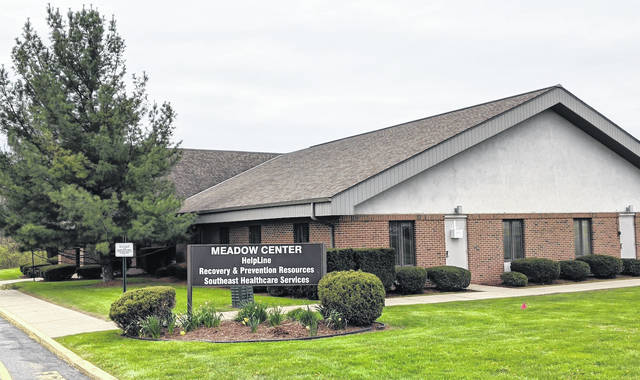MOUNT GILEAD — For the past six weeks mental health and recovery services at several agencies have been working remotely through Telehealth services.
“Everything has changed,” said Stable Cradle Coordinator and Maryhaven Mount Gilead Drug and Alcohol Counselor Courtnie Howell.
“Everything is by Telehealth on the phone or computer. Groups are no longer meeting and we are doing assessments on the phone or by Telehealth.”
Myken Pullins of Southeast Healthcare said that 90 percent of its clients have phones for Telehealth and in a few situations they have provided phones for clients.
Sue Hanson, Executive Director of Helpline of Delaware and Morrow Counties, said their hotline had a 60 percent increase in calls the third and fourth weeks of March.
Deanna Brant, Executive Director of Delaware-Morrow Mental Health and Recovery Services Board, said she met with all their agencies at the time of Gov. Mike DeWine’s stay-at-home order for the COVID-19 crisis.
“We immediately coordinated efforts with agencies and went to a telemedicine model with treatment groups,” Brant said. She compares the telemedicine or Telehealth meetings to Facetime and Zoom virtual communications.
Support groups
Brant said they have not seen a decrease in the number of Alcoholics Anonymous and other support groups. The main problem they sometimes have is that people don’t have computers, or other telecommunication means. The phone reception or Wi-Fi connection isn’t good in some areas.
“A few addiction groups are still occurring using CDC guidelines,” Brant added. “We are also still working with recovering housing and housing for persons with disabilities and shelters.”
Hanson said many Helpline questions have been work related as people lost work. There are also many more newly unemployed that are looking for food resources for the first time.
“Into April, calls leveled out some as people learned to deal with things day-to-day,” Hanson said. “People also found out that utility bills wouldn’t be a problem as utility companies said they wouldn’t shut off gas and electric.”
Resources
There is also a Helpline 211 resources list online with many listings for food pantries, housing and homeless shelters, tax information, clothing, mental health and support groups.
“Other calls the hotline gets are about struggles with isolation, home school problems and lately questions from health care workers who are struggling,” Hanson said. “Some people just need to talk to somebody.”
Helpline has increased staff due to the surge of calls and trained additional people as hotline specialists. One other challenge has been to keep up with changes in local resources, as some businesses have closed, or changed hours. They try to keep their resource list up-to-date.
Howell said her work with expectant moms in Stable Cradle who struggle with addiction has slowed down during the crisis. However, she is keeping in touch with them electronically, since they can no longer meet in a group.
Howell is now working at Maryhaven with a half dozen other counselors. They are doing evaluations for new clients on the phone as well as individual and group conferences. Psychiatrists are also doing evaluations and counseling on the phone.
“One new thing is that clinicians in their individual and group conferences are asking; ‘Are you in a safe place?’ and ‘Can you speak freely with us?’ That is different from when we could meet here with clients,” Howell said.
Howell said that support groups, AA and NA meetings are still meeting via Zoom or virtual telehealth meetings.
“I’m really glad Maryhaven can stay open and hope that continues,” Howell said. “It’s hard enough for all of us trying to deal with everything right now. Just imagine how hard it is for someone with drug or alcohol addiction, or serious mental health problems,” Howell said.
Hanson said they have also seen some “great things happening” in the last few weeks. “We have had many calls from people asking how they can help, Helping others in Morrow County is a great group. The Ohio State Highway Patrol has helped deliver food and the Amish in Morrow County built room dividers for hospitals and are making masks.”
“We want people to know we are here at Helpline 24/7 to connect and help with problem solving whether for food, mental health or sexual assault crisis,” Hanson said.
Helpline: 24-hour crisis hotline, information, referral and prevention, 419-947-2520 and 1-800-684-2324; Maryhaven in Mount Gilead, 419-946-6734; Southeast Healthcare in Mount Gilead, 419-949-2000.
Strive for Five challenge
A new statewide awareness campaign to help individuals and families cope during this time of isolation is called “Strive for Five.” The Ohio Department of Mental Health recognizes that many are experiencing feelings of stress, anxiety and isolation.
“You are encouraged to reach out, connect and comfort each other,” said a DMHAS spokesperson,
Brant said the Strive for Five challenge is simple and one that she uses.
The idea is to have five personal contacts everyday with people. They can be on the phone, computer, Skype, and Zoom, with family at home or even writing a note. Then check in with them daily for 30 days.
That personal contact and connection is the next best thing we can have to being with others and lessening feelings of isolation and the possibility of depression.






